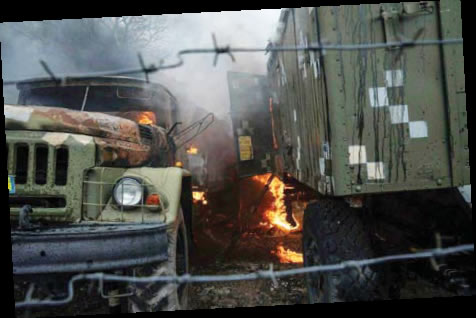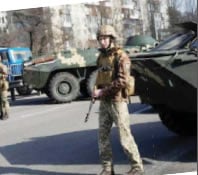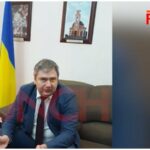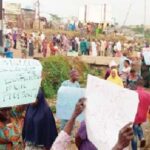For Josephine (surname withheld), an expectant mother in her third trimester, who by sheer providence escaped the crisis that followed Russia’s invasion of Ukraine over a week ago, the experience of the past few days has been her most dreadful ever.
From starving for days to trekking long distances before getting a bus to any of the four designated borders and the sheer uncertainty of getting through the stampede that awaited every fleeing national at the Ukrainian border, Josephine said the ordeal and the degenerating situation in the troubled country could make even the lion-hearted shiver with fear.
The reports of deaths, explosions and mass destruction of buildings and public infrastructure have been heartbreaking, just as the images and videos.
Since February 24 when Russian soldiers launched an offensive against Ukraine on the orders of their President, Vladimir Putin, on both sides, hundreds have been killed, while thousands children and women have sustained varying degrees of injury, including. Yet, there are clear indications that the war might get worse.
Putin had put his nuclear forces on high alert, the Russian forces have continued their missile strikes and reports said the phone conversation between French President, Emmanuel Macron, and Putin on Thursday indicated that the worst was yet to come. Thus, the fate of Ukrainians and other foreign nationals, including Nigerians, have continued to hang in the balance, even though the Russian forces have yet to take control of the Ukrainian capital city, Kyiv.
The Minister of Foreign Affairs, Geoffrey Onyeama, said there were about 8,000 Nigerians in Ukraine, with about 5,600 of them registered. And sequel to the escalated tension, the Federal Government has begun the evacuation of Nigerians from the neighbouring countries. The first evacuation flight arrived in Abuja from Romania on Friday morning, with many more to follow.
 But before the evacuation, many Nigerians caught in the tension shared with Saturday PUNCH the ordeal they went through between making their way out of Ukraine and entering the neighbouring countries safely.
But before the evacuation, many Nigerians caught in the tension shared with Saturday PUNCH the ordeal they went through between making their way out of Ukraine and entering the neighbouring countries safely.
Josephine said her experience was more harrowing because she was pregnant and had to be more careful to avoid a breakdown or bring any harm to her unborn child.
She told one of our correspondents on Wednesday, “I lived in Kyiv, the nation’s capital and the tension was higher there because it is the major target of the Russian troops. They believe if they can gain control of the capital city, displacing the President, Volodymyr Zelenskyy, would be easier.
“Remember, Putin had called for the Ukrainian military to oust him through a coup, to enable him to influence the emergence of a pliable president. So, I’m happy I made it out of Kyiv alive. Before the issue escalated, I got calls from both home and abroad asking me to leave but I felt it was more dangerous to be on the run and accidentally run into the gunfire or the missiles. That was why I didn’t leave on time.”
Narrating her torturous but successful journey to the Polish border, she said she summoned courage and fought her way into an evacuation train leaving Kyiv for Lviv when the opportunity came. She added, “By the time I boarded the train, all the seats were occupied, so I had to take a standing position for the six-hour ride. The story is easy to tell now but the experience wasn’t easy by any means. It’s tough for a physically fit person to stand in a moving bus for six hours not to talk of someone who is pregnant and is in her third trimester.”
But that was not the end; she said the journey from Lviv to the Polish border was another stressful one as she spent seven hours on the road. “When I arrived in Lviv, I boarded a bus at 3am going to the border and we didn’t get there until 10am,” she said. “It took that long because of the heavy gridlock on the way. From Poland, I went further to Hungary and made my way to the Nigerian Embassy in Budapest.”
Josephine feared that many Nigerians might be stranded in Ukraine, but she expressed hope that they would escape the attack. On Tuesday, a 22-year-old Indian medical student, Naveen Gyanagoudar, was killed in Kharkiv, Ukraine, when he left the bunker he had been staying in to buy food.
Similarly, no fewer than 47 persons were reportedly killed in Chernihiv on Thursday and Friday following air strikes by the Russian forces on high-rise apartments, clinics and a hospital. Several persons, including three Ukrainian troops, were also said to have been killed following an attack on Ukraine’s nuclear plant.
Like Josephine, Temitayo Kolawole said it took her about 24 hours to get to the Polish border and from there, it took her another 24 hours before she could get to a place of rest. “I was on the move for about two days without resting,” she said in an interview with Channels TV.
Kolawole, who lived in Zaporizhzhia, said she struggled to make her way to Lviv, where the Ukrainian-Polish border is.
She noted, “From Poland, other African students and I chartered a bus that took us to Hungary, where we met a large crowd. The Immigration officials took their time to screen us to ensure that no one smuggled weapons or any illicit substance across the borders. There was no form of racial discrimination. Only Ukrainian men aged between 18 and 60 were not allowed entry.”
Meanwhile, there have been some reports that students leaving Ukraine might lose their studentship and not be able to return to Ukraine, but Kolawole said the school assured them there would be nothing of such.
She said, “Till now we have not heard from them and there is a post going round that there is a possibility that we would be moved to a Polish university. We are not really sure about that. For now, there is no information from my school as regards how we would proceed with our studies. The only information we got was that we could get some psychological help or talk to a therapist, especially for those who were close to the attacks.”
While the past few days have been rough for Nigerians fleeing from Ukraine, their compatriots in the neighbouring countries who provided logistical assistance at the borders also described their experience as hectic.
The Chief Financial Officer, Nigerians in Diaspora Organisation, Poland, Mr Isaac Ikotun, said the crowd at the Polish border had made people resort to using other borders. He however pointed out that some Nigerians were still stranded in Ukraine.
He told one of our correspondents, “Since the Polish border has been fully crowded, more people are now making use of other borders, like the Hungarian and Romanian borders because some persons have reportedly spent up to three to four days at that spot in the cold, trying to enter Poland.
“Ambulances were there to help them but it was really bad and there have been reports of preferential treatments given to the Ukrainians and other whites. For instance 10 whites will go through before one black will go but thank God the whole crowdedness has subsided.”
 On the issue of Nigerians still in Ukraine, he added, “In the night we could get up to 15, 20 or 30 people. However, there are still some other cities in Ukraine that are on total lockdown and there are still a lot of Nigerians trapped there because those cities have really been affected by the missiles launched by the Russians, so everyone is indoors or in their bunkers.
On the issue of Nigerians still in Ukraine, he added, “In the night we could get up to 15, 20 or 30 people. However, there are still some other cities in Ukraine that are on total lockdown and there are still a lot of Nigerians trapped there because those cities have really been affected by the missiles launched by the Russians, so everyone is indoors or in their bunkers.
“We are still expecting more people, especially Nigerians, but at the moment, we, the NIDOP executives, have been able to stabilise. The stress is lesser now compared to the first five days.”
Speaking further on their interventions, Ikotun noted that NIDOP had rented a two-storey building with 30 beds to accommodate those arriving. “It’s already filled up as we speak,” he said. “That’s courtesy of NIDOP. The embassy is already doing their bit. In cases where there are no spaces for more people, we refer them to the embassy.
“The Polish government has really been cooperative and helpful. They are giving an opportunity to students from Ukraine to continue their studies in Poland and preference will be given to medical students, especially those in their fifth and final year. All they are required to do is to get their transcripts online from their schools’ portals.”
On how they identify Nigerians among the blacks, Ikotun said, “We give preference to Nigerians and in some cases I even try to identify Nigerians with pidgin English (laughs) and their accent before considering other nationals to join the bus because of the limited space.”
He said the organisation had virtually emptied its account and some of them had been using their personal funds for the exercise. “Our Public Relations Officer, Remi (Jimoh) has also spent a lot,” he noted. “He uses his company’s vehicle for the project and fuels it with his money most of the time. He has been able to provide job for a lot of students as well.
“We posted on Twitter that we needed funds and people have been responding positively from different parts of the world. The apartment that we rented yesterday costs about N1m equivalent.”
Also speaking, Jimoh who co-owns Bird HR Agency, said it was good that others joined in assisting Nigerians who crossed into Poland. “We used my company vehicles to get as many people as possible and thankfully NIDOP and the Nigerian Embassy followed suit by sending buses as well.
“We are doing all we can to help. We are in contact with all the other bodies and seeking more volunteers to come and help out.”
He said some Nigerians only spent a few days in Poland before moving to other countries, but that he had to accommodate some in the house he rented while his company also helped some students to get jobs, especially those who intend staying in Poland until the crisis was over.
Returnees need counselling – Expert
A psychologist, Prof Oni Fagboungbe, said the traumatic experience the returnees would have been subjected to could not be overemphasised, adding that some could have lost their self-confidence. He asked the government to organise counseling for them.
He added, “The government should come out fully to assume responsibility, organise counselling for them and give them support. Some of them could have left the country for a very long time, so coming back under this circumstance could have its effects. The government should accommodate them, provide everything they need at this time and constantly reassure them that it’s a temporary setback and they would still achieve their goals. They need to be encouraged not to drop their determination.
“It’s mainly the government’s responsibility, but for those of them who may have religious affiliation, their religious leaders should come to their aid, support them psychologically, socially and physically. If care is not taken, some of them might not recover from it in their lifetime because they have witnessed very devastating scenes.”
Reacting to the development, a former Nigerian Ambassador to France and Monaco, Mr Akin Fayomi, said the Federal Government did its best in handling the matter because the invasion caught most countries, including Nigeria, by surprise since no one expected a country to invade another without provocation in this modern day.
He however noted that all hands must be on deck to ensure that no Nigerian is left behind.
Fayomi, who is also a former Undersecretary at the Ministry of Foreign Affairs, said, “Indeed there had been warnings, particularly by the United States and United Kingdom, of an imminent invasion. The Americans had intelligence because they have drones and satellites that could see movement of tanks and troops, so they warned, but the whole world didn’t take that seriously.
“I am sure about 75 per cent of the countries would think Russia was bluffing and couldn’t in this modern day invade a country without repercussions. So, there was no prior reason to ask our people to come back home. Even the US that told its people to leave Ukraine didn’t evacuate its citizens; they just gave the warning and asked them to leave. In our case, the war came unannounced; the next best thing was what I think the government did by sending planes to bring them home.”
He said government’s response was more robust than it was during the xenophobia in South Africa and when Nigerians were attacked in Ghana.
Asked if Nigerians in Russia should also consider leaving since the US asked its citizens to, Fayomi said Nigeria and Russia had good diplomatic relationship and so there would be no need for such
On the lessons from this, Fayomi said, “If a situation like this arises, people’s first port of call should be the Nigerian embassy to hide in the compound where the flags are flying and no foreign troop would put its boot in the compound.
“We did that in Liberia and Sierra Leone before evacuation could be done. That means instead of students running helter-skelter, there should be a meeting point; they should run to the Nigerian embassy or the residence of the ambassador, and from there we could do the evacuation. That might have been a neater approach to the process.
“I know the Ministry of Foreign Affairs, NIDCOM and our missions are doing their best. The Director of Consular Affairs in the ministry and the ambassador are also at the border and they have promised not to leave until the last person is evacuated. Next time, we could give them the option of leaving and those who can’t, we assist them to leave.”
Fayomi expressed hope that diplomacy would prevail eventually in the Russia/Ukraine crisis. He added, “I sympathise with the people of Ukraine and the foreigners caught up, but being a diplomat, I believe in negotiations, mediation and conflict resolution, being the tenets of diplomacy. As the war progresses, negotiations are still ongoing in Belarus. I believe something will happen in the diplomatic arena if the negotiations continue.”
Copyright PUNCH.
All rights reserved. This material, and other digital content on this website, may not be reproduced, published, broadcast, rewritten or redistributed in whole or in part without prior express written permission from PUNCH.
Contact: [email protected]





